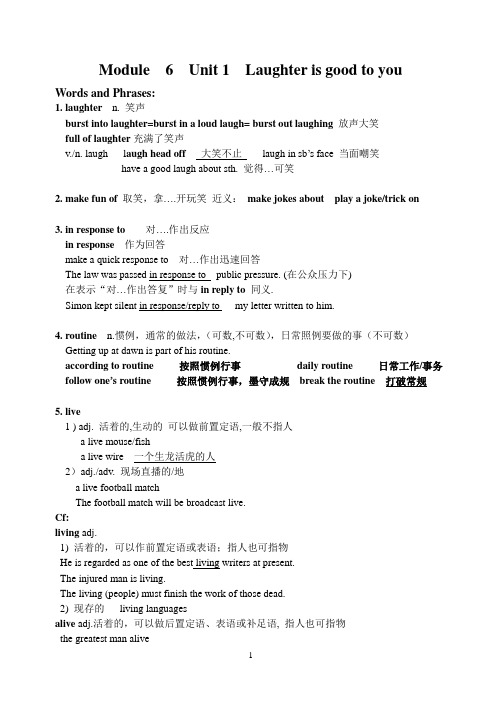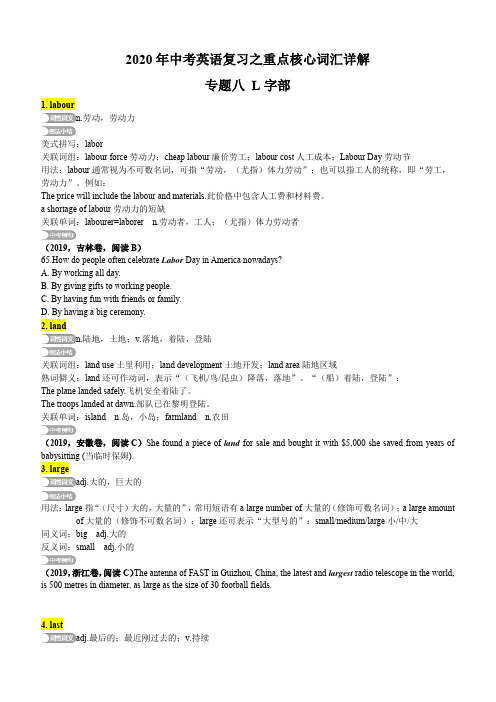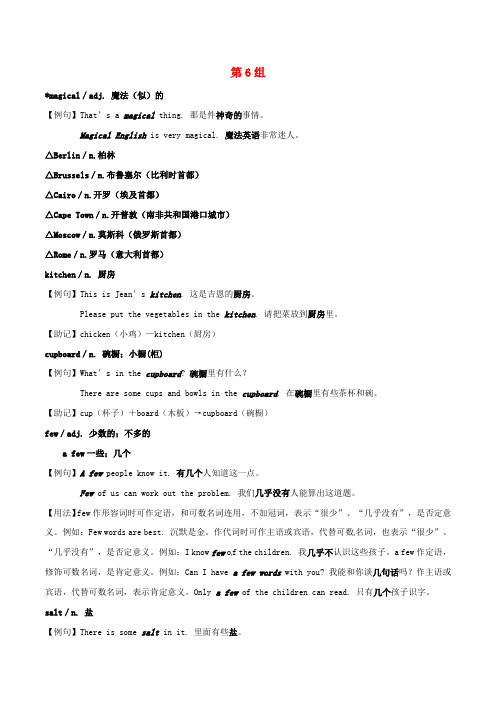laugh的用法和短语例句
laugh动名词形式

laugh动名词形式英文回答:The noun form of the verb "laugh" is "laughter." Laughter is the sound or action of laughing. It is a universal expression of joy, amusement, or happiness. We often laugh when something is funny or when we find something amusing. Laughter is contagious and can spread easily among a group of people.Laughter has many benefits. It can improve our mood, reduce stress, and boost our immune system. When we laugh, our body releases endorphins, which are natural painkillers and mood enhancers. It can also strengthen ourrelationships and create a sense of connection with others. For example, when we share a funny joke or a humorous story with our friends, we often laugh together and feel a bond.There are different types of laughter. For instance, there is a genuine laughter that comes from findingsomething genuinely funny. It is a spontaneous and natural reaction. There is also a polite laughter that we use to be polite or to show that we understand a joke, even if wedon't find it particularly funny. Additionally, there is a nervous laughter that we use in uncomfortable or awkward situations as a way to cope with the tension.Laughter is also a part of our everyday language and culture. We have many idioms and expressions related to laughter. For example, "laughing all the way to the bank" means to make a lot of money and be very happy about it. Another example is "laughing your head off," which means to laugh very hard or uncontrollably. These idioms and expressions add color and richness to our language.In conclusion, laughter is a powerful and universal human experience. It brings joy, improves our well-being, and strengthens our relationships. It is a language of its own that transcends cultural and language barriers. So,let's embrace laughter and find reasons to laugh every day.中文回答:动词"laugh"的名词形式是"laughter",意为笑声或笑的行为。
laugh的用法和固定搭配

laugh的用法和固定搭配
1. "Laugh at",就是“嘲笑”呀,比如说“别嘲笑别人的梦想,你不知道他们有多努力”。
你想想看,要是有人嘲笑你的梦想,你会开心吗?
2. "Laugh off"可以表示“一笑而过”呢,像“他总是能把困难一笑而过,
真是太厉害了”。
这是不是一种很洒脱的态度呀?
3. "Have a good laugh"是说“尽情地笑”,“我们昨天聚在一起尽情地笑,好开心啊”,这样的时光多美好呀!
4. "Laugh in someone's face",是“当面嘲笑”,“她竟敢当面嘲笑我,真是气死我了”,这种行为真的很让人恼火呢!
5. "Burst out laughing"表示“突然大笑”,“听到那个笑话,我们都突然大笑起来”,是不是很有画面感呀?
6. "Force a laugh",也就是“强颜欢笑”,“尽管很难过,她还是强颜欢笑”,多让人心疼呀!
7. "Laugh oneself silly"是“笑得前仰后合”,“看那个喜剧片的时候,我笑得前仰后合”,哈哈,真的好有趣!
8. "Laugh and the world laughs with you",“欢笑,世界与你同欢笑”,对啊,保持乐观,大家都会和你一起开心呢!
我觉得“laugh”这个词很神奇呀,能表达各种不同的情绪和情境,它
让我们的语言变得更加生动有趣呢!。
幽默名词英语

幽默名词英语以下为您生成 20 个关于幽默名词的相关内容:1. **Humor**- 英语释义:The quality of being amusing or comic; the ability to make people laugh or find things funny.- 短语:sense of humor(幽默感)- 单词:humorous(形容词,幽默的)- 用法:“He has a great sense of humor.”(他很有幽默感。
)- 双语例句:His humor made the party more enjoyable.(他的幽默让聚会更愉快了。
)2. **Joke**- 英语释义:A thing that someone says to cause amusement or laughter, especially a funny story.- 短语:tell a joke(讲笑话)- 单词:jokester(爱开玩笑的人)- 用法:“She cracked a joke to lighten the mood.”(她讲了个笑话来缓和气氛。
)- 双语例句:That joke really got everyone laughing.(那个笑话真的让大家都笑了。
)3. **Comedy**- 英语释义:A type of entertainment, such as a play, film, or television show, that is intended to make people laugh.- 短语:comedy show(喜剧表演)- 单词:comic(形容词,喜剧的;名词,喜剧演员)- 用法:“I love watching comedy movies on weekends.”(我喜欢在周末看喜剧电影。
)- 双语例句:This comedy is very popular among young people.(这部喜剧在年轻人中很受欢迎。
M6U1重点单词和短语

Module 6 Unit 1 Laughter is good to youWords and Phrases:1. laughter n. 笑声burst into laughter=burst in a loud laugh= burst out laughing 放声大笑full of laughter充满了笑声v./n. laugh l augh head off 大笑不止laugh in sb’s face 当面嘲笑have a good laugh about sth. 觉得…可笑2. make fun of取笑,拿….开玩笑近义:make jokes about play a joke/trick on3. in response to 对….作出反应in response 作为回答make a quick response to 对…作出迅速回答The law was passed in response to public pressure. (在公众压力下)在表示“对…作出答复”时与in reply to 同义.Simon kept silent in response/reply to __ my letter written to him.4. routine n.惯例,通常的做法,(可数,不可数),日常照例要做的事(不可数)Getting up at dawn is part of his routine.according to routine 按照惯例行事daily routine 日常工作/事务follow one’s routine 按照惯例行事,墨守成规break the routine 打破常规5. live1 ) adj.活着的,生动的可以做前置定语,一般不指人a live mouse/fisha live wire 一个生龙活虎的人2)adj./adv. 现场直播的/地a live football matchThe football match will be broadcast live.Cf:living adj.1) 活着的,可以作前置定语或表语;指人也可指物He is regarded as one of the best living writers at present.The injured man is living.The living (people) must finish the work of those dead.2) 现存的living languagesalive adj.活着的,可以做后置定语、表语或补足语, 指人也可指物the greatest man aliveIs the fish still alive?be buried/caught alive 被活埋/活捉;lively生动的,活泼的,可以做定语、表语,指人也可指物;He gave a lively description of his interview.Ex:1. The bear was caught ____ .(D)A. liveB. livelyC. livingD. alive2. The World Cup in France was the biggest ___________ football match in the world. (B)A. aliveB. liveC. livelyD. living3. It was the first interview I’d done in front of a live audience.4. She had to steal food just to stay alive .5.He taught us a lively class (生动的课)a moment ago.6.amuse vt. 使…快乐,逗笑,给….提供娱乐amuse sb (with sth/by doing sth. )The sailor amused the boy by telling him a story.Her job is to amuse the children.amused adj. be amused at/ by /with 以…为乐be amused to do sth. 做…取乐an amused lookamusing adj. 有趣的,可乐的amusement n. un. 娱乐,消遣cn.快乐的事,娱乐amusement park 儿童乐园,游乐场to one’s amusement 使---感到有趣的是7. somehow adv. 不知何故,设法,总算(= somehow or other )Somehow (or other) I was able to solve the problem myself.Somehow I came to like him.anyhow adv. 无论如何,反正,不管怎样I am going anyhow, no matter what you say.somewhat adv. 稍微,有几分He looked somewhat surprised.8. tough adj.This material is as tough as leather(皮革). 坚韧的,牢固的,折不断的The steak(牛排) was so tough I couldn't eat it. (肉等)老的,咬不动的He is a tough nut . 顽固的,固执的He is a very tough man. 不屈不挠的,刚强的That was tough work. 棘手的,费劲的The boy is tough enough to carry that heavy bag. 强壮的,结实的9. master1) n. 主人; 大师,师傅;硕士(常用Master)He likes to be his own master.a master in literature/paintingMaster of Arts 文学硕士 a master’s degree 硕士学位be master of …能控制be master of fate/ oneself/ one’s time /the situation2) v. 控制,掌握; 精通master one’s anger抑制愤怒master English精通英语10. take on雇用;承担(工作,责任);呈现,显现take on a new secretarytake on more work /the responsibilitytake on a new look拓展:take down 写下,记下take for 把...误认为take in欺骗;吸收,吸纳take off 起飞;匆匆离开;脱下;take 3 days off 休假3天take away 减去take over 接收,接管take to 喜欢,开始从事take care of 照顾,照料take up 开始从事,着手处理take it easy 别紧张take your time 慢慢来11. move on 接下去,继续动词+ 副词on 表示该动作继续进行下去eg: read on , write on ,go onmove on to sth. 开始做别的事;换(话题)Can you move on to the next item?12. skill un. 本领,本事,cn.(特殊的)技术,技能Skiing requires skill and strength.Reading skills will be more important than oral skills.skilled adj. 有技能的,熟练的,需要技术的be skilled in/ at doingShe was skilled enough in French to translate a novel.她法语足够熟练可以译小说。
2020年中考英语复习之重点核心词汇详解8:L字部含答案

2020年中考英语复习之重点核心词汇详解专题八L字部1. labourn.劳动,劳动力美式拼写:labor关联词组:labour force劳动力;cheap labour廉价劳工;labour cost人工成本;Labour Day劳动节用法:labour通常视为不可数名词,可指“劳动,(尤指)体力劳动”;也可以指工人的统称,即“劳工,劳动力”。
例如:The price will include the labour and materials.此价格中包含人工费和材料费。
a shortage of labour劳动力的短缺关联单词:labourer=laborer n.劳动者,工人;(尤指)体力劳动者(2019,吉林卷,阅读B)65.How do people often celebrate Labor Day in America nowadays?A. By working all day.B. By giving gifts to working people.C. By having fun with friends or family.D. By having a big ceremony.2. landn.陆地,土地;v.落地,着陆,登陆关联词组:land use土里利用;land development土地开发;land area陆地区域熟词僻义:land还可作动词,表示“(飞机/鸟/昆虫)降落,落地”、“(船)着陆,登陆”:The plane landed safely.飞机安全着陆了。
The troops landed at dawn.部队已在黎明登陆。
关联单词:island n.岛,小岛;farmland n.农田(2019,安徽卷,阅读C)She found a piece of land for sale and bought it with $5,000 she saved from years of babysitting (当临时保姆).3. largeadj.大的,巨大的用法:large指“(尺寸)大的,大量的”,常用短语有a large number of大量的(修饰可数名词);a large amount of大量的(修饰不可数名词);large还可表示“大型号的”:small/medium/large小/中/大同义词:big adj.大的反义词:small adj.小的(2019,浙江卷,阅读C)The antenna of FAST in Guizhou, China, the latest and largest radio telescope in the world, is 500 metres in diameter, as large as the size of 30 football fields.4. lastadj.最后的;最近刚过去的;v.持续关联词组:at last最后,终于;last year/month/week/night/summer去年/上个月/上周/昨晚/去年夏天;the last minute/moment最后一刻,紧急关头熟词僻义:last还可以作动词,表示“持续”,不用于进行时,后面也不一定要接时间状语。
八年级英语上册 单词巧学妙记 第6组素材 人教新目标版

第6组*magical/adj. 魔法(似)的【例句】That’s a magical thing. 那是件神奇的事情。
Magical English is very magical. 魔法英语非常迷人。
△Berlin/n.柏林△Brussels/n.布鲁塞尔(比利时首都)△Cairo/n.开罗(埃及首都)△Cape Town/n.开普敦(南非共和国港口城市)△Moscow/n.莫斯科(俄罗斯首都)△Rome/n.罗马(意大利首都)kitchen/n. 厨房【例句】This i s Jean’s kitchen. 这是吉恩的厨房。
Please put the vegetables in the kitchen. 请把菜放到厨房里。
【助记】chicken(小鸡)—kitchen(厨房)cupboard/n. 碗橱;小橱(柜)【例句】What’s in the cupboard? 碗橱里有什么?There are some cups and bowls in the cupboard. 在碗橱里有些茶杯和碗。
【助记】cup(杯子)+board(木板)→cup board(碗橱)few/adj. 少数的;不多的a few一些;几个【例句】A few people know it. 有几个人知道这一点。
Few of us can work out the problem. 我们几乎没有人能算出这道题。
【用法】few作形容词时可作定语,和可数名词连用,不加冠词,表示“很少”、“几乎没有”,是否定意义。
例如:Few words are best. 沉默是金。
作代词时可作主语或宾语,代替可数名词,也表示“很少”、“几乎没有”,是否定意义。
例如:I know few o f the children. 我几乎不认识这些孩子。
a few作定语,修饰可数名词,是肯定意义。
例如:Can I have a few words with you? 我能和你谈几句话吗?作主语或宾语,代替可数名词,表示肯定意义。
人教版英语八年级上册第三单元短语语法知识点总结
Unit3I’mmoreoutgoingthanmysister 一、词组、短语:01.moreoutgoing更外向/更开朗,02.as...as...与……一样,03.thesingingcompetition歌咏比赛,04.themostimportant最重要的,05.betalentedinmusic在音乐方面有天赋,06.thesameas与……相同07.careabout关心/留意/关注,08.bedifferentfrom与…不同,09.belikeamirror像一面镜子,10.aslongas与…一样长,11.bringout显示/显出/生产/带来,12.getbettergrade取得好成绩,13.reachfor伸手达到/达到14.touchone’sheart感动,15.infact事实上,16.makefriends交朋友,17.begoodat在某方面成绩好,18.theother另一个,19.besimilarto对…熟悉,20.begoodwith与…和睦相处二、重要句子:01.SamhaslongerhairthanTom.萨姆的头发比汤姆的长。
02.ShealsosingsmoreloudlythanTara.她唱歌也比泰拉声音大。
03.Nellysangsowell.内莉唱得如此好。
04.Forme,agoodfriendlikestodothesamethingsasme.对于我来说,好朋友喜欢跟我做相同的事情。
05.Whoissmarter,yourmotheroryourfather谁更聪明,你妈妈还是你爸爸?06.It’snotnecessarytobethesame.没有必要相同。
07.Ithinkagoodfriendmakesmelaugh.我认为好朋友会让我笑。
08.Mollystudiesharderthanherbestfriend.莫莉比她更好的朋友学习更努力。
L字母开头的英语短语
L字母开头的英语短语英语是按照分布面积而言最流行的语言,但母语者数量是世界第三,仅次于汉语、西班牙语。
它是学习最广泛的第二语言,是近60个主权国家的官方语言或官方语言之一。
下面是店铺为大家收集的L字母开头的英语短语,欢迎阅读,希望大家能够喜欢。
L字母开头的英语短语1、labour along缓慢而费力地前进2、laugh at因…而发笑/嘲笑3、laugh off用笑摆脱(困境等)4、laugh over笑着谈论5、launch out(船)下水/开始新事情6、lay aside把…放在一边/储存7、lay down放下/铺设(铁路)8、lay hold of握住/控制住/占有9、lay off停止/(临时)解雇10、lay out花费/布置/摆开11、lay over涂/覆盖/压倒12、lay up贮存/储蓄/暂停使用13、lead the way引路/带路/示范14、lead to通向/导致/引起15、lead up to把…一直带领到/导致16、learn by heart记住/背诵17、learn from学习/向…学习18、learn of听到/获悉…的事19、learn off记熟/背下来20、leave alone听其自然/不要去管21、leave behind丢弃/留下/忘记携带22、leave off(使)停止/停下来23、leave out忽略/遗漏/省略24、let alone不干涉/不碰25、let down放下/降低/使…失望26、let go放开/释放/发射27、let in让…进入/放…出来28、let off放(炮)/开(枪)/宽恕29、let out放掉(水等)/发出30、let up减小/(雨等)渐渐停止31、lie down躺下/(故意)躺下不干32、lie in在于/分娩/睡懒觉33、lie on依赖/压迫/折磨(人)34、lie over等待以后处理35、lie up卧床/(船)入坞36、light up照亮/点(烟)37、like any thing象什么似地/拼命地38、limber up使柔软/柔和一下身体39、line up排队/使排成一行40、link up把…连(衔)接起来41、listen for等着听…(的声音)42、listen into收听/监听/偷听43、listen to听/倾听44、little by little一点一点地/逐渐地45、live off住在…之外/靠…生活。
laught用法(一)
laught用法(一)用法介绍:laugh的多种用法1. 动词用法•laugh at:嘲笑,当你嘲笑或取笑某人时使用。
例如:–He laughed at his friend’s silly joke.(他嘲笑了他朋友的愚蠢笑话。
)•laugh about:大笑,某事让你感到非常有趣或好笑,通常和朋友一起分享时使用。
例如:–We laughed about the funny movie all night.(我们整晚都因为那个搞笑电影笑个不停。
)•laugh off:对某事物轻描淡写地一笑置之,不予理会。
例如:–They laughed off the criticism and continued with their work.(他们对批评一笑置之,并继续工作。
)•burst out laughing:爆发性地大笑。
例如:–The comedian’s joke was so funny that the entire audience burst out laughing.(喜剧演员的笑话太搞笑,全场观众都爆发性地大笑。
)2. 名词用法• a burst of laughter:一阵笑声,表示突然爆发的大笑。
例如:–His funny imitation caused a burst of laughter in the room.(他搞笑的模仿引起了房间里的一阵笑声。
)• a fit of laughter:一阵笑,连续不停地笑。
例如:–The joke he told set off a fit of laughter among the audience.(他讲的笑话引起了观众的一阵笑声。
)• a contagious laughter:一种传染性的笑声,表示一人笑起来,周围的人也跟着笑。
例如:–Her contagious laughter made everyone in the room laugh as well.(她的传染性笑声让房间里的每个人也跟着笑。
laugh at sb’s expense的例句
“Laugh at sb’s expense”这个短语在英语中的意思是“以某人为代价而嘲笑”,用来形容一个人为了满足自己的幽默感而拿他人的不幸或错误开玩笑。
这样的行为往往是不尊重和不恰当的,因此在正式场合或者对他人的尊重和理解中应该避免这样的行为。
下面是一些关于“laugh at sb’s expense”的例句:1. It's not nice to laugh at someone else's misfortune.(嘲笑别人的不幸是不礼貌的。
)2. I felt embarrassed when my friends laughed at my expense in front of everyone.(当我的朋友们当着大家的面笑话我时,我感到很尴尬。
)3. It's not okay to make fun of others at their expense.(以他人为代价来取乐是不可取的。
)4. She always makes jokes at other people's expense, which is really mean.(她总是拿别人的不幸开玩笑,这真是太刻薄了。
)5. Laughing at someone's expense is a form of bullying and should not be tolerated.(以某人为代价而嘲笑是一种欺凌行为,不应该被容忍。
)6. I don't like how they always laugh at their coworkers' expense, it's not professional.(我不喜欢他们总是拿同事的不幸开玩笑,这不是专业的表现。
)7. Even though it may seem harmless, laughing at someone's expense can be hurtful.(即使看上去可能是无害的,嘲笑他人的不幸也是具有伤害性的。
- 1、下载文档前请自行甄别文档内容的完整性,平台不提供额外的编辑、内容补充、找答案等附加服务。
- 2、"仅部分预览"的文档,不可在线预览部分如存在完整性等问题,可反馈申请退款(可完整预览的文档不适用该条件!)。
- 3、如文档侵犯您的权益,请联系客服反馈,我们会尽快为您处理(人工客服工作时间:9:00-18:30)。
laugh的用法和短语例句
laugh有发笑;笑;嘲笑等意思,那么你知道laugh的用法吗?下面跟着小编一起来学习一下,希望对大家的学习有所帮助!
laugh的用法大全:
laugh的用法1:laugh的基本意思是笑嘲笑以笑表示,指某人因高兴、惊奇等而笑或指某人、某事让人觉得好笑,尤指出声地开怀大笑,重在笑出声,常伴有表情和动作。
laugh作笑解时是不及物动词;作笑着表示解时是及物动词,接名词或代词作宾语,也可接以形容词充当补足语的复合宾语。
laugh可接同源宾语,该同源宾语前通常有形容词hearty, merry等修饰。
laugh的用法2:laugh与away〔off〕连用,意为以笑表示,用笑来驱除;与at连用时用于贬义,表示因而笑,也可表示嘲笑;接about 表示对感到好笑而发笑,接over 表示想到或谈到某事而发笑。
laugh的用法3:laugh作笑,笑声,笑态解时是可数名词,指具体的笑的动作,可指一般地发笑或出声地大笑。
laugh的用法4:laugh还可作笑料解,指引人发笑的事情或人,常用单数形式。
laugh的用法5:在口语中, laugh也可表示有趣,常用复数形式,有时含有讽刺意义。
laugh的常用短语:
用作动词(v.)
laugh about (v.+prep.)
laugh at (v.+prep.)
laugh away (v.+adv.)
laugh down (v.+adv.)
laugh into (v.+prep.)
laugh off1 (v.+adv.)
laugh off2 (v.+prep.)
laugh out of (v.+adv.+prep.)
laugh over (v.+prep.)
laugh with (v.+prep.)
用作名词(n.)
break into a laugh
have the last laugh
have〔get〕the laugh of〔on〕
raise a laugh
laugh的用法例句:
1. For what do we live, but to make sport for our neighbours, and laugh at them in our turn?
我们活着是为了什么?不就是给邻居当笑柄,再反过来笑他们。
2. Do not hesitate to laugh at anything you find amusing.
只要觉得好笑就尽管笑。
3. He was falsely jovial, with his booming, mirthless laugh.
他低声苦笑了几声,装出快乐的样子。
4. They laugh so hard they double up with laughter.
他们捧腹大笑,直不起身来。
5. The blunt comment made Richard laugh in spite of himself.
这番率直的话让理查德不由自主地大笑起来。
6. Lysenko gave a deep rumbling laugh at his own joke.
李森科说笑话的时候自己咯咯直乐。
7. She tried to laugh, and the sound was harsh and strident.
她想笑,但声音听起来尖锐刺耳。
8. Bev made her laugh, the way she was always clowning around.
贝夫用她一贯滑稽耍宝的方式逗她发笑。
9. Leonard was working at his German. His mistakes made her laugh.
伦纳德正在学习德语,他出的洋相让她哈哈大笑。
10. The joke got a big laugh, which encouraged me to continue.
我的笑话引来哄堂大笑,这使我深受鼓舞,继续往下讲。
11. The British dont laugh at the same jokes as the French.
法国人觉得好笑的笑话,英国人不一定会笑。
12. He burst into a high-pitched laugh, as though hed said something funny.
他突然放声大笑,好像讲了什么好笑的事似的。
13. Murray Picks hollow laugh had no mirth in it.
默里皮克的干笑里没有一点快乐。
14. Weve both had a good laugh about the accident despite whats happened.
虽然出了意外,但我俩事后都一笑置之。
15. For no reason at all the two men started to laugh.
两个人莫名其妙地开始大笑。
